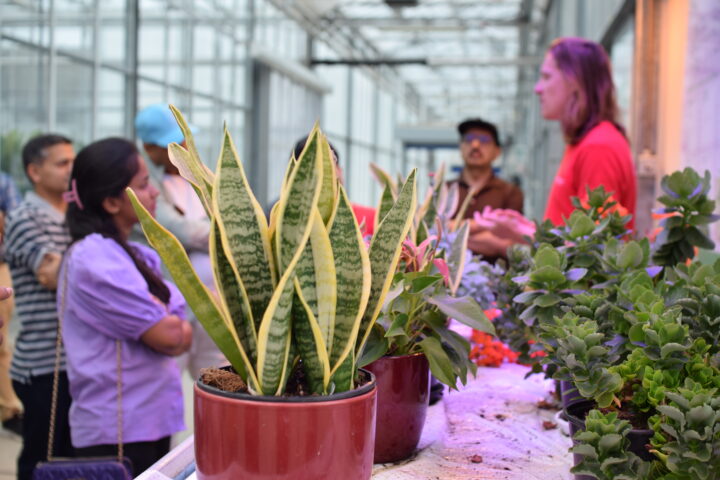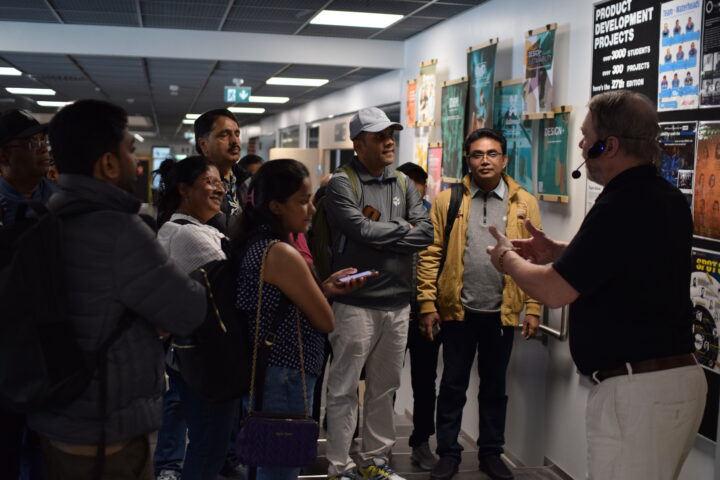Post-visit Reflection from the Nepal Team

A group of ACCESS partners from Universities of Kathmandu and Purbanchal visited Finland and Netherlands 3-14 June 2024. Attached below is their report from the visit and their experience in Europe.
Wageningen University and Research in the Netherlands
The Nepal team was excited about the visit to Wageningen University and Research in the Netherlands, as there were several learning opportunities. On day one (3 June 2024), we got to know each other at Wageningen University and Research (WUR), and met project team members from WUG and two universities from Sri Lanka. The Dean’s (Prof. Arnold Bregt) speech was about educational governance and the possibilities for exploring several collaborative opportunities. We also discussed society-based education’s connection with several components of society. The sustainable tour was amazing, as we got opportunities to learn how to manage the available resources to make the environment sustainable.
“We got a chance to extend and strengthen our North-South and South-South collaboration and helped to reinforce our determination to consistently contribute on clean energy, climate change and sustainability issues in a broader way.” – Sunil Prasad Lohani, Renewable and Sustainable Energy Laboratory (RSEL), Kathmandu University.
The Unifarm tour was another excellent learning opportunity. We endeavored to understand the establishment of a dedicated and systematic research culture within the university. We also got an opportunity to participate in the energy alliance meeting. The meeting was thought-provoking, and the Nepal team presented the current research status in the area of energy. The Sri Lanka team also focused on climate change, energy, and power generation with indigenous resources. In addition to this, the session on AI in Education was another interesting one. It was highly interactive, and we, as participants, shared our ideas during the sessions. We realized that we needed to live with AI by learning its ethical uses. The take-home message was that universities now should develop clear guidelines mentioning which areas AI can be used and which areas AI can not be used.

The Wandar lab tour made us think about the possibilities of working with dedicated persons who are passionate about developing some products that are useful in solving real-world problems.
The session on students’ evaluation and assessment was great, as we got several ideas on the entire process the university is using in its evaluation system. The entire idea was based on the principle of portfolio-based assessment in which the student’s performance is evaluated on the basis of different rubrics. We have taken teaching-learning, and assessment as inseparable entities. It was observed that the entire assessment system was scientifically designed.
On the last day, we reflected on all the activities, and we also discussed the possible dates for the upcoming project activities.
Finland Visit
After completing our activities in the Netherlands, we moved to Finland. The presentations at the University Partnership for International Development (UniPID) were really impressive. We gained insight into the collaborative culture of Finnish universities during the course creation process. We also discussed online learning approaches and what is going on with virtual studies programs in Finland, observed their innovative spaces, and had talks on future collaboration possibilities.
In addition, we met with the Climate University staff and the Ministry for Foreign Affairs in the afternoon. In the ministry, we briefly shared our ongoing actions and expressed our interest in collaborating in the future.
“During my travel to the Netherlands and Finland as part of Kathmandu University’s ACCESS project (supported by ERASMUS), I learned how to combine multidisciplinary approaches of thinking and research to promote sustainability in education in general, and climate change education in particular. Another notion that grabbed my interest and made me ponder how I may connect educational enterprises in my Department/School, where I am a faculty member.” – Binod Prasad Pant, Kathmandu University School of Education.
We had the opportunity to hear firsthand the challenges of the design, development, and implementation of the Climate University from a teacher’s point of view.

The most important event was a two-day conference in Finland. In many ways, the 24th Future Conference on the Future of Natural Resources was inspiring for all of us. The discussion on the multi-, inter-, and transdisciplinary nature of education was at the heart of the conference. The development of a mindset that incorporates integral worldviews was also focused. The papers presented in the parallel sessions and workshops conducted at the conference were useful for us.
“Mitigating climate change starts with each of us. To mitigate climate change, every individual across the globe has to feel that Climate Change is not only a Global issue but an individual’s issue as well.” – Hemant Kumar Goit, Faculty of Engineering, Purbanchal University.
Summing up, the 15-day visit was a great learning and sharing opportunity. It empowered us as general university academics and project team members in particular.